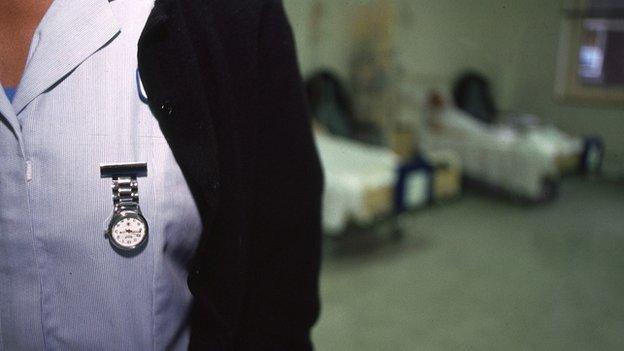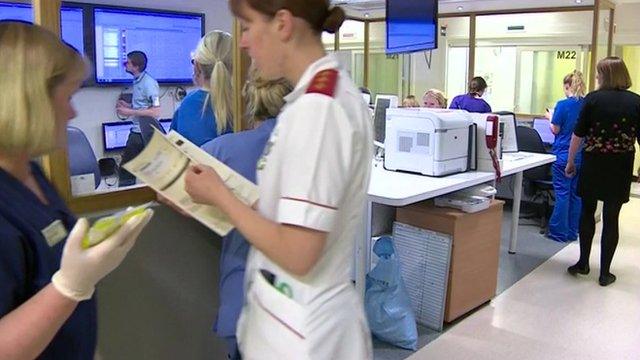Sanctions target 'rip-off' NHS temps
- Published

The government has announced measures to clamp down on "rip-off" staffing agencies used by the NHS to plug gaps in nursing and doctor rotas.
It will set a maximum hourly rate for temps and cap the amount trusts that are struggling financially can spend.
The agencies' body says they are being scapegoated "for the NHS's own mismanagement of workforce planning".
NHS foundation trusts in England spent nearly £2bn last year on agency staff, external - more than twice the planned amount.
Health Secretary Jeremy Hunt said the cost of agency and contract staff across the entire NHS in England last year was £3.3bn and staff costs had spiralled out of control.
On one occasion, an agency nurse cost the NHS £2,200 for a 12-hour shift, and a doctor £3,700 for a 30-hour shift.
In some instances, more than half of the money went to the agency itself.
And hospitals are increasingly hiring expensive management consultants, which cost the NHS nearly £600m last year.
Health Secretary Jeremy Hunt accuses agencies supplying staff to the NHS of acting "totally irresponsibly"
Cap prices
The measures will be phased in over the next few months and include a cap of £50,000 applied to all management-consultancy contracts.
Any trust needing to exceed this for clinical reasons will have to get permission from the regulator, Monitor, or the Trust Development Authority.
Currently, many NHS trusts manage their agency spend through framework agreements that cap prices.
Rates are negotiated by central government, and recruitment agencies should adhere to them.
Bargaining power
But under the new measures, agencies charging above the odds will be barred from use.
At the same time, the pay packets of some NHS senior managers will also be trimmed. Currently, more than a fifth of all directors in the NHS earn more than £142,500 - the amount the Prime Minister is paid. Mr Hunt is asking Trust bosses to justify why.
Mr Hunt said: "The NHS is a public service and needs to show restraint on handing out generous pay packages as a matter of course.
"Expensive staffing agencies are quite simply ripping off the NHS.
"It's outrageous that taxpayers are being taken for a ride by companies charging up to £3,500 a shift for a doctor.
"The NHS is bigger than all of these companies, so we'll use that bargaining power to drive down rates and beat them at their own game."
Simon Stevens, chief executive of NHS England, has said the rising costs are partly due to hospitals putting more nurses on wards, following the public inquiry into the Stafford Hospital scandal.
Others blame government mismanagement of the NHS.

Analysis
Agency staff will always have a role in the NHS.
The government's beef is not about using temps to cover busy periods or staff sickness.
It is about an over-reliance by the NHS in England on expensive locums that line the pockets of what Mr Hunt calls "rip-off" agencies.
So why is this happening, and who's to blame?
Many agency nurses have had long careers as NHS employees but have left - because of the pay and the hours, for example.
Some shifts, such as working in A&E, are particularly hard to fill.
When the work is brutal, or the hospital is unpopular, it can be hard to find permanent staff to take up posts.
Jobs abroad may be far more attractive for NHS employees and new graduates.
The industry body that oversees recruitment agencies says the root problem is poor workforce planning, which has left the NHS short of nurses.
The Royal College of Nursing agrees. It says too many nursing posts have been cut and too few student nurses are coming up the ranks to fill the void.
Arguably, without agency staff pitching in, the NHS and its patients would suffer.

Recruitment and Employment Confederation director of policy Tom Hadley told BBC News: "The language and tone from Jeremy Hunt is outrageous.
"Nobody objects to there being set parameters for pricing of agency staff, but they already exist in the form of NHS framework agreements."
'Monumental waste'
Andy Burnham MP, Labour's shadow health secretary, said: "The decision to cut 6,000 nursing posts in the early years of the last Parliament, alongside big reductions in nurse training places, has left the NHS in the grip of private staffing agencies.
"The Tory government is responsible for this monumental waste of NHS resources."
The British Medical Association said the overspend on management consultants had been to help hospitals navigate the government-driven reorganisation of the NHS.
Dr Peter Carter, head of the Royal College of Nursing, said while it was right to clamp down on excessive spending, "this will only work alongside longer term solutions, like converting agency staff to permanent staff, and continuing to increase training places to catch up with demand".
Royal College of Physicians welcomed the controls but said that checking locums were fully qualified and "high quality" was more important.
'Strong message'
Claire Billieness, managing director of an agency called HCL workforce solutions, which supplies the NHS with temporary staff, hoped the move would help create a level playing field for agencies.
"Approved framework rates do already exist," she said.
"However, it is the enforcements of these rates that has been a problem in the past.
"It will also send a very strong message to career locums that holding out for the best price is no longer an option."
Danny Mortimer, of NHS Employers, said: "We welcome this focus on the agency market. Clearly, we await further detail."
- Published31 May 2015

- Published22 May 2015
